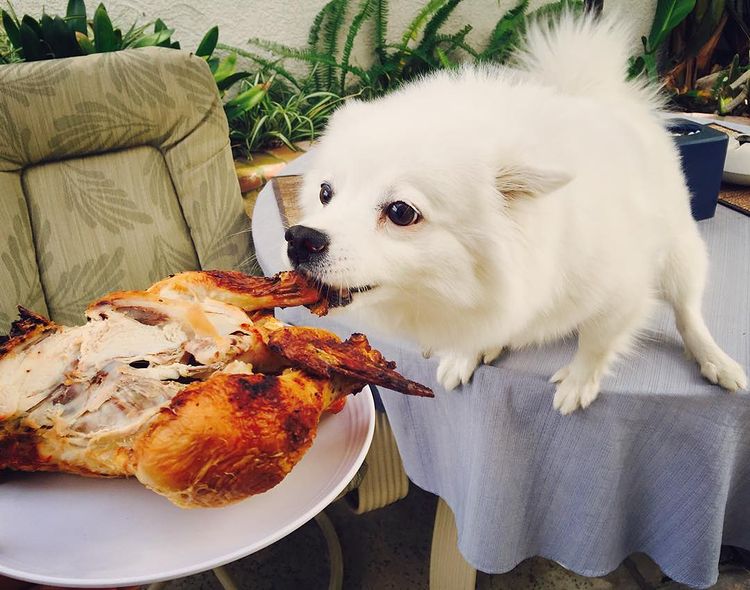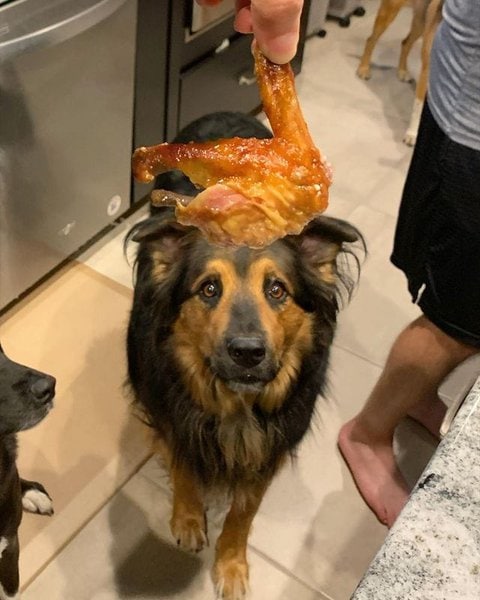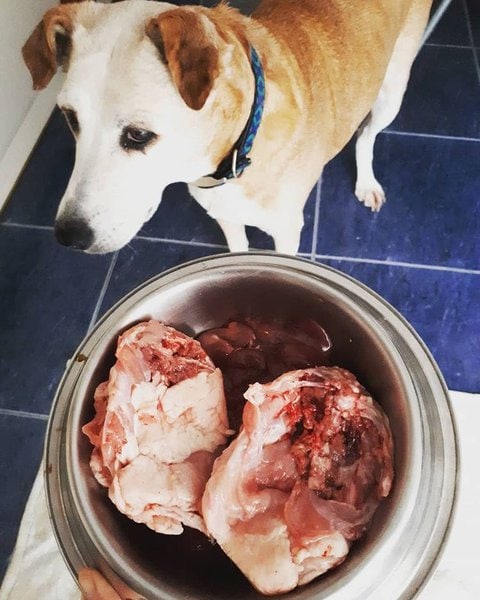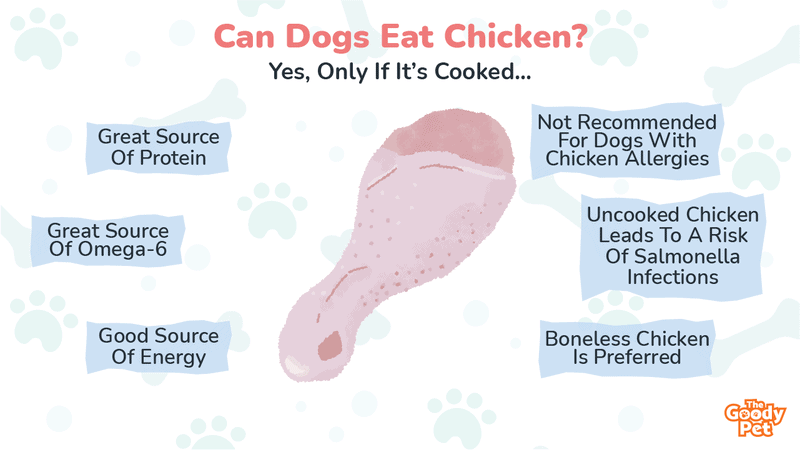Dogs are favorite companions for most people, and most of them evolved from wolves thousands of years ago. To live a healthy lifestyle, a dog needs a balanced diet of proteins, vitamins, and micronutrients. Most dog owners wonder whether they can feed their dog chicken as an included ingredient in their dog treats or as part of their everyday meals. So, is chicken good for dogs?
Yes, for most dogs, chicken is safe for consumption because it is easily digestible and a safe protein. Dogs can consume chicken, but only if it’s thoroughly cooked. Chicken is one of those meats ideal for satisfying a dog’s high-protein diet requirements. Many companies use chicken as part of the main ingredients in their mixes for the high protein.
Feeding your dog chicken every day is a healthy way to reduce calories while delivering essential nutrients to your pooch. However, as with anything food-related for dogs, the type of food your pooch consumes matters as much as the diet. Keep reading to get a better insight into feeding chicken to dogs.
Can Dogs Eat Chicken?

Yes, dogs can eat cooked chicken. It’s a safe and easy-to-digest form of protein. However, dog owners are advised to feed their pooch a serving of less than a half-ounce of boneless chicken.
Ensure the chicken you serve your dog is thoroughly cooked. In addition, the chicken should be cooked with no onions, seasoning, or garlic.
Notably, most sources usually discourage feeding your dog raw chicken because of the risk of bacterial or Salmonella infections. However, the movement towards feeding your dog raw food is growing, including raw chicken and raw chicken bones.
If you are not certain about feeding your dog raw food diets, you should try mixing it with your dog’s regular food, mix with a healthy grain or serve it as a treat.
However, before serving your dog chicken, you need to be aware of two things.
- Some dogs have a chicken allergy, and it’s among the top ten allergy-inducing ingredients for dogs. The common allergens for dogs are chicken, rabbit, egg, fish, beef, soy, wheat, and lamb.
- Ensure you take cooked chicken from its bone because cooked chicken bones usually split easily, and this can cause a gastrointestinal tract puncture or choking.
Can Dogs Eat Cooked Chicken?
Yes. Dogs can eat cooked chicken, and it’s a safe and easy-to-digest form of protein. However, dog owners are advised to feed their pooch a serving of less than a half-ounce of boneless chicken.
When you cook chicken, ensure you remove bones from the cooked chicken because the bones are hazardous as they can splinter easily. In addition, even though chicken is an extremely healthy meal for your pooch, it does not contain all the nutrients it needs.
Ensure the chicken you serve to your dog is thoroughly cooked. In addition, the chicken should be cooked with no onions, seasoning, or garlic.
Apart from cooked chicken, you can feed your dog vegetables and red meat to ensure your pooch gets a balanced diet meal.
Can Dogs Eat Raw Chicken?
No. Your dog should not eat raw chicken. Raw chicken is 100% natural and unprocessed meat. Although some people argue that offering chicken in raw form is healthy since dogs are descendants of wolves.
Unfortunately, raw chicken can be dangerous for both you and your dog. Even though raw chicken is not problematic, it’s not always safe.
However, the raw diet movement has gained much traction among human beings who focus on raw and plant-based whole foods. Notably, raw food, especially raw chicken, will come with consequences even for humans.
It’s believed that consuming raw food, including raw chicken, allows the food to maintain its nutrients more than cooked food. However, raw food leaves lingering bacteria behind. This applies to both dogs and human beings.
In addition, feeding your pooch raw chicken will put them at risk of contracting bacterial infections or Salmonella. So, cook the chicken for your dog to enjoy safely, or consult your veterinarian when you are in doubt.
What Are the Benefits Of Giving Your Dog Chicken?

While some dogs may react to eating chicken, some will experience benefits from adding chicken as part of their diet. There are several benefits of chicken in dog food, and that’s why it’s a number one ingredient.
Not only is it a tasty treat, but chicken is packed with physical benefits for your pooch. There are three main reasons why you should feed your dog chicken, and they include:
Good Source Of Energy
Chicken is lean meat, and it offers plenty of benefits for dogs. Dogs need protein to provide a source of energy, and chicken provides the boost without having a high-calorie count.
Chicken provides a big energy source for pooches. Any excess protein that is not needed for muscle tissue maintenance is used as a source of energy.
In addition, chicken is one of the most easily-digestible proteins enjoyed by most dogs, and therefore it’s a plus. It is also easily available and affordable, making it one of the most obvious choices for an energy source when it comes to dog food.
Great Source Of Omega-6 Fatty Acids And Amino Acids
Chicken is an excellent source of glucosamine and amino acids, building blocks for proteins. Out of twenty-two amino acids that dogs need, ten need to be acquired through supplements or diet.
Diet sources of amino acids are found within proteins, with the highest concentration being in animal proteins like chicken.
Omega-6 fatty acids will help your dog shine and sustain a very healthy, glossy coat. Feeding your dog with food that is primarily chicken meat, and tossing a few bites as a tasty treat for your pooch, will be great for building lean muscle tissue and bone health.
In addition, chicken parts, such as the liver, kidney, and heart, should be included in the pooch’s diet as these parts supplement its diet in plenty of ways.
These chicken parts are rich sources of vitamins A, B, D, and F, and they also provide your pooch with minerals like phosphorus, copper, or zinc. This can substitute 20% of the full dog’s diet.
Builds Lean Muscle Mass
Poultry, including chicken, builds lean muscle mass in dogs by delivering omega-6 fatty acids.
However, muscle mass will break down as your dog keeps active or aging and needs to be replaced. Chicken is the ideal solution for this, as it helps the dog stay healthy and feel good.
How Much Chicken Can A Dog Eat Every Day?
Since feeding your dog chicken is safe, it is important to know how much chicken is safe for consumption every day. If you opt to add chicken or any poultry into your dog’s diet, it should comprise 10% of its total calories consumed every day.
In that regard, the World Small Animal Veterinary Association (WSAVA) has developed a chart that guides a dog owner of daily calorie consumption based on the dog’s weight.
For example, if a dog weighs 44 lbs, which is the average weight of a medium-sized dog, it should take in approximately 790 calories every day.
Chicken should comprise 10% of that total, which is 79 total calories. However, generally, it is healthy to feed your dog about ⅓ cup or 1.76 ounces of chicken.
In addition, remember this amount of chicken depends on the ideal weight of your pooch and not its actual weight. Feeding your dog the correct amount of chicken as a supplement can reduce its size or bring it to a healthy weight, especially if it is on a diet.
Also, vets recommend that dog owners feed their dogs chicken when they suffer from diarrhea or stomach upsets in the ratio of 2:1.
If your dog is struggling to go to the bathroom or having constipation, feed it a bowl of bland rice and a chicken diet. If the dog eats one cup a day, feed it ⅓ cup chicken to ⅔ cup rice until it’s back to normal.

How Often Should Your Dog Eat Chicken?
It depends. If the chicken has no additives, hormones, or potentially harmful ingredients, it is a great source of protein.
However, you don’t want your dog to feed exclusively on chicken to the point it ends up rejecting other food types. This is possible because chicken is a favorite for most dogs, and it will leave your pooch licking its whiskers.
You can feed your dog with small portions of boiled skinless chicken together with its regular diet once or twice a week as a tasty dinner treat. Alternatively, you can use a small portion of cooked chicken as a high-value reward during training.
Remember to always consult with your vet before making any drastic changes to your dog’s diet, especially if you have concerns about its nutritional balance and stomach issues.
What Is the Best Way To Prepare Chicken for My Dog?
You can cook your chicken in many different ways, but the same does not apply to your dogs. However, even though you might be used to roasting, grilling, sauteing, or searing the chicken in your meals, this preparation does not apply to a dog’s diet.
Preparing chicken for your dog is simple, and this means there is no reason to go the whole way. The best way is to ensure you cook your dog’s chicken at an internal temperature of over 165°F to destroy any harmful bacteria.
Avoid adding butter or oil while cooking as this may cause gastrointestinal issues, and in some severe cases, it may cause pancreatitis.
While you may prefer your chicken to be less bland and be spicy and have some crispy skin, this kind of food is not for your pooch. Your dog’s digestive system is too sensitive to take this treatment.
Some dogs are more sensitive to fat in their food, and therefore it’s advisable to feed your dog chicken breast without skin. In addition, you should avoid adding salt, sauces, or seasonings to the chicken you will feed the dog.
Are There Any Risks Of Feeding Chicken To Your Dog?
Yes, there are several risks of feeding your dog chicken, both cooked and uncooked. While some dog owners may choose to focus only on the benefits of feeding raw chicken to their pooches, the risks can be life-threatening and should not be ignored.
If you feed your dog raw chicken, it comes with some risks. It is also a huge concern if raw chicken forms the main part of its diet. Below are some risks of feeding your dog chicken:
Salmonella Infections
Salmonella infection is mainly caused by food poisoning in many undercooked or uncooked foods, including chicken. Normally, the bacteria is found in the feces or intestines of animals, and therefore, it’s not safe to consume.
When you’re handling chicken, the chances of these bacteria spreading to their countertops, utensils, hands, dishes, dog bowls, and your dog will increase. If these bacteria enter a dog’s mouth at high levels, infections or symptoms of Salmonellosis can occur.
Without a microscope, you cannot see Salmonella, so there is no way to know if the raw chicken you want to feed your dog is contaminated.
However, some symptoms that indicate that your dog may have been infected with Salmonella include diarrhea, fever, lack of appetite, vomiting, and lethargy.
Treatment may involve the use of antibiotics and other medications combined with IV fluid therapy. However, it is not wise to ignore the infection, and it can be fatal to your dog, especially if it has a poor immune system or is suffering from severe gut dysbiosis.

Malnutrition
If you feed your dog an exclusive diet of raw chicken or it consists of the main percentage in your dog’s food, there is a chance your pooch will experience serious malnutrition.
Chicken cannot be a complete and balanced food for dogs. In addition, if dogs don’t receive the appropriate minerals and vitamins it needs, they can suffer from various issues like organ issues and broken bones.
Dogs need more than chicken to be strong and healthy. Therefore, if you feed your pooch a balanced diet plus chicken, you can eliminate the risk of malnutrition.
Chicken Bones
Chicken consists of bones, and if you are feeding raw chicken to your dog, there’s a high chance there will be a bone in the chicken. Therefore, when feeding your dog cooked chicken, you should ensure you remove the meat from the bone.
Bones can cause obstructions in your dog’s intestinal tract or stomach, get stuck in its throat or mouth, puncture its internal organs or break its teeth. Whether you are feeding your dog cooked or raw chicken, ensure you remove any bones, as this will minimize this risk.
Allergies
As great as all the benefits sound, dogs can be allergic to chicken, and this type of meat is among the top ten allergy-inducing ingredients for dogs. It is commonly known as poultry allergy, and it is caused by an overactive autoimmune response while breaking the amino acids in the chicken.
This condition can lead to skin allergies, obsessive licking and biting, vomiting, chronic infections, and an upset stomach. Also, if you observe any unusual changes in your dog’s skin, behavior, or stool after they eat freshly cooked chicken or a chicken-based treat, ensure you consult your vet.





